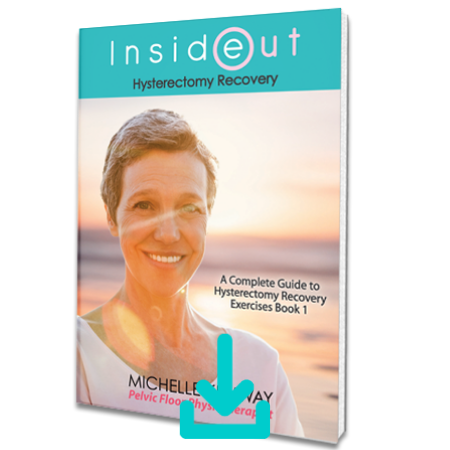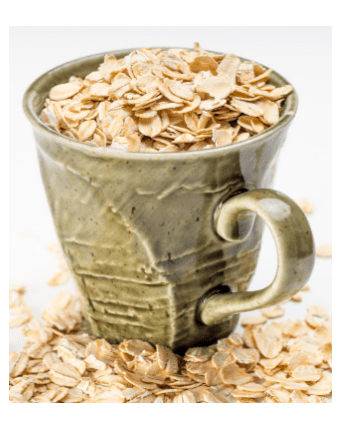what to eat and drink after a hysterectomy
Your hysterectomy recovery diet tin help you optimise healing (tissue repair) and avoid some of the common bowel problems after abdominal or vaginal hysterectomy surgery.
Read on below this video for data to help your hysterectomy recovery:
- Diet that promotes fast tissue healing
- Best foods to restore the gut microbiome later on a hysterectomy
- Diet for managing hysterectomy constipation
- Foods that soften the stool after hysterectomy
- Nutrition to reduce gas and bloating later on hysterectomy surgery
- How to reduce IBS symptoms after hysterectomy
- Postoperative hysterectomy recovery is non the time to experiment with your diet
Hysterectomy Recovery Diet Timestamps
1:02 Protein sources to promote healing
three:05 Prebiotic foods to restore the gut microbiome
5:01 Foods that cause painful gas and bloating
6:59 Diet for hysterectomy constipation
Hysterectomy Recovery Exercises eBook

Reduce the adventure of common hysterectomy side effects and promote the speed of your recovery.
Ideal for:
- Early on hysterectomy recovery (abdominal or vaginal hysterectomy)
- Preparing for a hysterectomy
- Reducing the risk of common side effects e.g. low back pain, constipation and gas
- Preparing your body for return to work and regular action.
Hysterectomy Recovery Diet
Your postoperative hysterectomy diet includes the nutrient and fluids you swallow.
The best hysterectomy recovery diet depends on individual needs and levels of tolerance to different foods and fluids.
There are general dietary principles that tin can promote tissue healing and reduce the risk of some commonly occurring postoperative bowel problems after a hysterectomy.
Diet-Related Bug After Hysterectomy
 A number of potential bowel issues afterward a hysterectomy tin exist addressed with an advisable hysterectomy recovery diet.
A number of potential bowel issues afterward a hysterectomy tin exist addressed with an advisable hysterectomy recovery diet.
Bowel problems afterwards hysterectomy include:
- Constipation
- Excessive gas and bloating
- Abdominal pain
- Gut problems related to altered microbiome
Hysterectomy Recovery Diet that Promotes Fast Healing
Poly peptide demands are increased for tissue healing during hysterectomy recovery. The human torso uses amino acids derived from poly peptide to build collagen and repair tissues.
The torso doesn't store poly peptide so it needs to be consumed daily. Most women require around 2.5-3 daily servings of protein during postoperative hysterectomy recovery.
Aim to include one serving of lean protein in each of the three chief meals throughout the 24-hour interval to ensure adequate poly peptide intake.

- 65g or 2.2oz cooked lean reddish meat (e.g. beef, lamb, veal or pork)
- 100g or 3.5 oz cooked fish or small can tinned fish (tuna or salmon)
- 80g or 2.8oz lean (skinless) chicken or turkey
- 2 eggs
- i cup pulses (beans and legumes)
- 170g or 6oz tofu
- 1 serve of depression fat dairy due east.g. 3/4 cup yogurt, i/2 cup ricotta cheese or 1 cup milk
- Poly peptide supplements including whey protein, pulse poly peptide or egg (albumin) poly peptide mixed into a poly peptide rich smoothie
Nutrition to Restore the Gut Microbiome After a Hysterectomy
The leaner, viruses and fungi are microorganisms that live in our gut and make up our gut microbiome.
Some women develop long-term bowel problems after hysterectomy which may be related to altered microbiome.
Information technology's now idea that the gut microbiome may be afflicted past surgery. It's possible that the stress of surgery may alter the gut microbiome two. Antibiotics later on surgery can also disturb the gut microbiome causing bowel symptoms.
Symptoms of a disturbed gut microbiome include:
- Intestinal pain
- Excessive gas and bloating
- Constipation
- Diarrhoea
- IBS
Probiotic supplements are not necessarily the reply to restoring the microbiome after antibody treatment. Recent research suggests that taking probiotics afterwards antibiotics may be of no do good in restoring the original microbiome3.
Including sure foods in the nutrition can feed beneficial gut bacteria and improve the overall wellness of the gut microbiome. Foods that feed the gut microbiome are called prebiotic foods.
It's important to annotation that some of the post-obit prebiotic foods tin cause gas and bloating. Avoid introducing new foods or foods that upset your gut causing gut symptoms specially during your early hysterectomy recovery.

- Asparagus
- Bananas
- Legumes*
- Onions*
- Garlic*
- Leeks*
- Chicory
- Jerusalem artichoke
- Root vegetables (potatoes cooked and cooled earlier to eating)
- Rice (cooked and cooled before to eating)
- Yogurt (Greek yogurt or bootleg)
- Fermented drinks (Kombucha or Kefir)
* These foods tin cause gas and should exist consumed with circumspection after hysterectomy.
Foods that disrupt the gut microbiome include:
- Animal poly peptide*
- Saturated fats e.g. visible fat on meat, butter, cheese, palm oil
- Alcohol overconsumption
* Poly peptide in the daily diet is of import for healing, peculiarly during the first 3 months after hysterectomy. If you reduce your animal protein intake, brand certain that your overall daily poly peptide intake is adequate for healing.
Hysterectomy Recovery Diet for Constipation
Constipation is a mutual problem later hysterectomy.
Postoperative factors contributing to constipation after hysterectomy include:
- hurting relieving medications
- decreased physical activeness
- internal swelling
- gut flora changes (after antibiotics and surgery)
- pelvic pain
- being away from dwelling in the hospital.
How to Soften Your Stool Subsequently Hysterectomy
Various problems can cause constipation later hysterectomy. One factor causing constipation is having a hard stool.
Difficult stools can brand emptying painful and women are oftentimes fearful of pain with bowel movements after hysterectomy.
Keeping your stool soft and well formed tin can brand bowel emptying more comfortable and help to avoid straining.
Foods that soften the stool
Some foods, spices and fluids tin can soften the stool. Examples of stool softener foods include:
- Fruit – prunes, peaches, plums, pears*, kiwi fruit, apricots
- Vegetables – squash, capsicum, spinach, leafy greens, broccoli*, brussel sprouts*, legumes*
- Cereals – oats, bran, wholemeal breadstuff, multigrain cereals
- Spices – chilli, curry
- Fibre supplements – psyllium* husks (Metamucil)
- Water
* These foods can increase gas so avoid or consume with caution after hysterectomy. Tinned beans create less gas than beans that are stale and soaked before cooking so these may be an option for some women decumbent to gas.
Foods that firm the stool
Some foods can house the stool. If your stool is besides difficult you may effort limiting your intake of some of the following foods later surgery.
Foods that firm the stool:
- White bread
- White rice
- Low fibre pasta
- Cheese
- Fatty foods (slow digestion)
- Processed foods (cakes, biscuits, pretzels)
Avoid Eating too Much Fibre
Eating a diet rich in fibre is important for bowel wellness. Healthy adults are usually advised to swallow 30g or 1oz of fibre daily.
Eating too much fibre tin can make constipation worse if you're already constipated, peculiarly foods loftier in insoluble fibre.
Insoluble fibre doesn't break down well with chewing and tin can't be digested in the gut. Insoluble fibres include whole grains and thick skins of some fruit and vegetables.
If y'all're already constipated, eating too much insoluble fibre can further slow your bowel and make you even more than constipated.
Some women demand to reduce their intake of high fibre to a lower fibre nutrition when constipated. When the bowel is emptied (frequently with the assist of laxative medication) more fibre tin can then be gradually re-introduced into the diet.
Medication for Constipation After Hysterectomy
If you lot're prone to constipation, information technology's a expert idea to discuss the employ of advisable laxative medication with your medical caregiver prior to hysterectomy surgery.
Osmotic laxatives are routinely prescribed by some gynaecologists to avoid constipation and straining afterward hysterectomy. These laxatives are often taken daily to prevent constipation during early hysterectomy recovery.
Osmotic laxatives piece of work past drawing fluid into the bowel rather than irritating the gut lining so they act gently, don't develop dependency and are usually safe to utilize due east.yard. Movicol, Osmolax or MiraLAX. When taking osmotic laxatives ensure that you have a good fluid intake for maximum benefit.
Check with your pharmacist or doctor earlier starting any new medication after surgery.
Diet to Reduce Gas and Bloating After Hysterectomy Surgery
Gas hurting and bloating can be very painful and pitiful after a hysterectomy.
If you're suffering from gas hurting yous may reduce gas past avoiding or minimising your intake of gas producing foods.
Gas producing foods for circumspection include:
- Brassica family unit vegetables e.m. cabbage, brussel sprouts, cauliflower
- Peas and beans
- Onions
- Pears
- Dried fruits (especially sulphur dried) east.g. figs, pears, apricots and prunes
- Bran
- Some artificial sweeteners e.g. Sorbitol
- Caffeine
- Soft drinks
- Beer
Nutrition to Relieve IBS Symptoms afterward Hysterectomy
The depression FODMAP nutrition is a research-based arroyo to eating developed at Monash University (Australia)and is used extensively by dieticians world-wide.
Some women gain nigh immediate relief from their IBS (Irritable Bowel Syndrome) symptoms by following a low FODMAP diet.
The depression FODMAP diet removes or reduces sure foods and additives from the diet that are non well captivated in the gut. These foods contain symptom triggers known every bit fermentable carbohydrates (abbreviated to FODMAPS). FODMAPS sit in the gut and ferment producing gas, flatulence and abdominal pain in some individuals.
A consummate discussion and links to further reading on the low FODMAP diet can be establish at Monash University.
The low FODMAP nutrition can provide an effective solution for managing IBS symptoms associated with contradistinct gut microbiome. Research shows that IBS is linked with having an altered gut microbiome1.
When yous tin can manage your IBS symptoms through the low FODMAP diet you may so choose to accost your diet to improve the wellness of your gut microbiome (see side by side section).
Early Hysterectomy Recovery is not the Time to Experiment With Diet
Early postoperative hysterectomy recovery diet should ideally consist of foods that your body tolerates well.
During the early stages of hysterectomy recovery your belly is likely to be more sensitive. Foods that crusade constipation, diarrhoea, gas and bloating can increment abdominal pain peculiarly if you're someone who is already susceptible to bowel discomfort.
Some women detect that eating a bland diet including readily digestible high protein foods is virtually advisable during early on stage recovery. Discover how your body reacts to your diet and progress your diet co-ordinate to how well yous feel and your concrete symptoms.
Key Points for Hysterectomy Recovery Diet for Bowel Management
- During early recovery swallow foods that yous normally tolerate well
- Accost constipation by managing your fibre intake and stool consistency with advisable nutrition and/or medication
- Manage gas and bloating by eliminating or limiting your intake of gas producing foods
- Manage IBS by learning virtually the low FODMAP diet and working with a dietician to help you identify and reduce the foods that are triggering your symptoms
- Meliorate the health of your gut microbiome with your diet subsequently your initial healing to avert gut symptoms such as gas and bloating.
Further Reading
» Lose Belly Fat after Hysterectomy
» 10 Solutions for Shifting Gas After Hysterectomy
» Hysterectomy Weight Loss – Proficient Health Professional person Practice Guidelines
» Stool Softener Foods that Avoid Prolapse Worsening
References
1Y. Ringel, Y and Ringel-Kulka, T (2015). J. Clin. Gastroenterol. 49 Suppl one (2015) S56-59.
twohttps://www.mdedge.com/acssurgerynews/article/150736/general-surgery/early-testify-shows-surgery-can-modify-gut-microbiome
3Suez, J. et al (2018) Post-Antibody Gut Mucosal Microbiome Reconstitution Is Impaired by Probiotics and Improved by Autologous FMT. Sep half-dozen;174(6):1406-1423.
*This article provides general information and is not a substitute for medical treatment. Always follow the specific advice of your medical provider (surgeon or dietician) regarding your hysterectomy recovery nutrition.
Source: https://www.pelvicexercises.com.au/hysterectomy-recovery-diet/



0 Response to "what to eat and drink after a hysterectomy"
Post a Comment